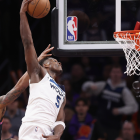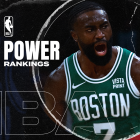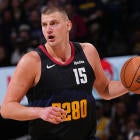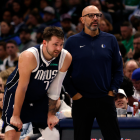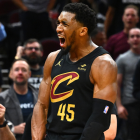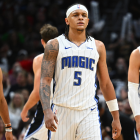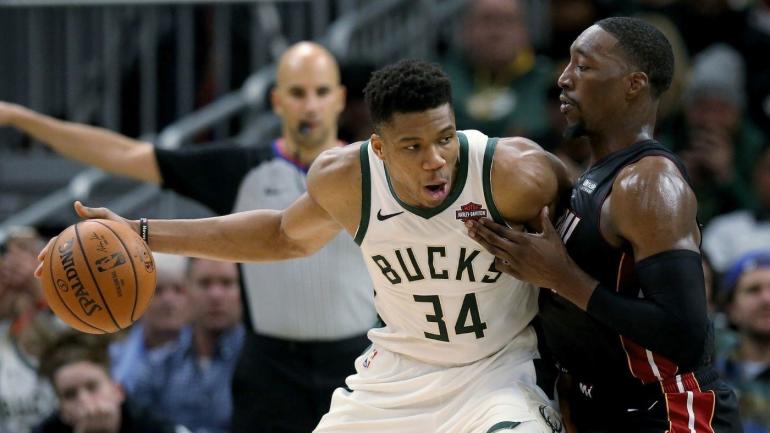
Bam Adebayo entered the 2020 offseason in a somewhat difficult position. Rookie extensions for All-Stars are normally a very simple matter. The player asks for the max. The team grants it. The player remains with the team for years to come. There's rarely any drama attached.
But Adebayo's situation was unique. His Miami Heat hope to use 2021 cap space to add a superstar. Specifically, they expect that superstar to be Giannis Antetokounmpo. Their track record suggests, at a bare minimum, that they will be in the running for his services. But the pandemic has complicated things. The 2021 salary cap was originally projected to land at $125 million. Now? There's a range. The NBA and NBPA agreed that it will rise between three percent (to $112.41 million, the expectation) and 10 percent ($120.05 million). The Heat have built their roster over the past several seasons with $125 million in mind. If the cap really comes in at $112.4 million, $12.6 million of the cap space they've carefully planned for evaporates. The salaries they've already committed to obviously do not.
At a bare minimum, that made committing to any new salaries for the 2021 offseason far costlier. So far this offseason, we'd seen the Heat avoid such commitments at all costs. The contracts they agreed to all either expired in time for the summer of Giannis or held team options for the 2021-22 season.
That changed when the Heat agreed to give Adebayo a five-year, max contract that could pay him as much as $195 million in total. The deal was well-earned and saves him the risk of having to play out the season without long-term security, but it threw a major wrench into Miami's 2021 plans thanks to a cap quirk that punishes teams for giving their young players early contract extensions. Signing Adebayo now replaces his relatively tiny 2021 cap hold with a new, market-value salary.
What are cap holds and what do they have to do with Bam?
When calculating cap space, players under contract are a simple proposition. They count for the salary they are getting paid. When a player is not yet under contract, but the team is retaining their rights in free agency, things get a bit trickier. Instead of having an actual salary number on the books, they have a predetermined amount called a cap hold. That amount can vary wildly depending on circumstances. For players coming off of the fourth season of their rookie contract, it is functionally based on draft position.
The cap hold for fourth-year restricted free agents who made less than the NBA's average salary in the previous season is 300 percent of their previous salary. That salary is based on draft slot. Adebayo was the No. 13 overall pick in the 2017 NBA Draft, and will make $5,115,492 this season. That would have given him a cap hold of $15,346,476 in the summer of 2021. This number has nothing to do with what Adebayo is actually worth or what he will get paid. It is merely a placeholder for cap purposes until he signs a new contract with the Heat.
This is the position Adebayo would have found himself in next summer. His rookie contract would have expired, and that would have made him a restricted free agent. He never would have left Miami because his restricted status would have given the Heat the right to match any offer, but the mere fact that he reached restricted free agency instead of getting a max deal would have mattered tremendously from a cap perspective. Bam was not the No. 1 overall pick. The fact that he's become this good from later in the draft could have created quite a bit of what would have amounted to free cap space.
How meaningful will that be? Well, it depends on the exact structure of the deal. Max contract extensions are written to be based on a percent of the cap rather than an exact dollar figure. The dollar figures are written in when the cap is determined ahead of the deal's first year. Typically, a fourth-year max starts at 25 percent of the salary cap. If that cap figure is around $112.4 million, his max would start at $28.1 million. If it's $120 million, that max starts at $30 million. Adjust as needed depending on where the cap falls.
But there's another important caveat here. The Heat may have included Rose Rule escalators into the deal. This would allow Adebayo's deal to start at up to 30 percent of the cap if he earns one of the following honors: MVP, Defensive Player of the Year or All-NBA. We don't yet know the specifics of the deal, but if they're included at the max, it would bring Adebayo's cap hold up to around $33.7 million under the lower cap estimate and $36 million at the highest. Basically, this means that extending Bam now instead of making him wait will cost the Heat somewhere between $12.75 million and $20.65 million in cap space.
Forcing Bam to wait would not have prevented the Heat from giving him the max eventually. They just would have had to wait until after they used their 2021 cap space. In other words, Bam would get his money in the summer of 2021 instead of right now. Obviously, for his purposes, that would have been less than ideal and exposed him to an enormous amount of risk. That risk was only magnified when the offseason was condensed. Coming off of an injury in the NBA Finals and with only two months of rest between the Finals and this season, Adebayo's urgency to get that new deal only increased. He got it. And Miami's 2021 cap situation is all the more difficult because of it.
Where do the Heat sit for 2021 now?
Miami had practically an entire roster under team control for the 2021-22 season before this extension, but only three players are under guaranteed contracts. The first is rookie Precious Achiuwa, who will make around $2.7 million. The second is former second-round pick KZ Okpala at $1.8 million. The last is the big one: Jimmy Butler, who is owed over $36 million. Everybody else is either currently under a team option or has a non-guaranteed deal.
Now, that doesn't mean the Heat will just let everyone else walk for free. They will at least enter the offseason above the cap, with the rights to a number of players still on their books if needed:
- Tyler Herro's option will be picked up this offseason. It's too good a value at $4 million to be declined.
- Goran Dragic ($19.4 million), Meyers Leonard ($10.2 million) and Avery Bradley ($5.9 million) all agreed to deals with team-options this offseason. Chris Silva ($1.8 million) and Andre Iguodala ($15 million) already had team options. These can be wiped away easily enough if necessary.
- Duncan Robinson and Kendrick Nunn are in the position Bam almost was. They, too, will be restricted free agents, but their situations are even more complex. As undrafted free agents, their cap holds could be as low as $2.1 million. However, if either reaches the "starter criteria" for a restricted free agent, that hold gets bumped up to around $4.7 million. To hit that criteria, a players needs to start at least 41 games or play at least 2,000 minutes next season, or average those totals over last season and next season combined. These figures will presumably be tweaked for the sake of back-to-back shortened seasons, but the basic idea remains the same: the Heat are technically incentivized to play Robinson and Nunn less for the sake of limiting their cap holds. Robinson appears a near-lock to hit the starter criteria, though, while Nunn's situation is less certain.
- The Heat still have around $5.2 million in dead money on their books after using the stretch provision to waive Ryan Anderson last summer. This money can't be removed from the cap sheet for any reason. The only exception would be if the Heat successfully applied for a career-ending injury exemption, but that is unlikely for a number of reasons.
Some of these players are higher priorities than others. There is no free-agent prize great enough to decline Herro's option. They'd simply trade him for draft picks if the need presented itself. But creating cap space becomes meaningfully more difficult with Bam's raise factored in.
Let's do some basic math. Say the Heat managed to offload literally every salary on their books except for Butler and Adebayo, and Adebayo's max comes in at the lowest $28.1 million figure. In this scenario, the maximum amount the Heat could offer Giannis in the first season of his deal would be around $33.7 million. Miami would just barely have that much space here. Butler and Adebayo come in at $64.1 million. Anderson's dead money counts for another $5.2 million. They would also have 10 incomplete roster charges—cap holds for minimum-salary rookies—on their books to offset their empty roster slots. The rookie minimum would be $925,258 under this cap, so 10 of them would cost $9.25 million. That would leave them with around $33.8 million in space, just barely enough to fit Giannis or a similarly-aged superstar in at the max.
In this scenario, the Heat are also severely limited in what they could offer other, non-Giannis free agents. The three-best non-Giannis free agents of 2021 will all have more than 10 years of experience when they hit the market: LeBron James, Kawhi Leonard and Paul George. That increases the possible first-year salary of their max deals to 35 percent of the cap. The Heat have no path to that total whatsoever with Butler and Adebayo on the books.
If the cap rises, the Heat have a bit more flexibility, but remember, Antetokounmpo's max rises with it. Even the best-case scenarios limit Miami's flexibility. From a functional perspective, the takeaway here is this: the Miami Heat will not have max cap space in 2021. They might come close to it, but they aren't going to be able to get there outright. If they want to add a superstar free agent in 2021, they are going to have to take an alternative path.
How could the Heat pursue Giannis, or another star free agent, with these limitations?
Let's make this clear: Miami has wiggled its way out of far worse salary cap jams in the past. The Heat operate with the philosophy that if a star player wants to join their team, there is always a way to make that happen. The 2019 offseason was a perfect example of that. Jimmy Butler wanted to sign with the Heat. They didn't have anywhere near enough money to make that happen. So they sent Josh Richardson to Philadelphia and managed to dump Hassan Whiteside's contract on Portland in order to duck below the hard-cap and fit Butler in.
A similar scenario would need to play out to get Giannis to the Heat. It would have to be a sign-and-trade and a complicated one at that. The Heat would have to send out enough salary to legally match Antetokounmpo's incoming figure, or 80 percent of it. This is why the Heat gave out so many team options this offseason. They knew that if they didn't have max cap space, they needed to have matching salary for trade purposes on the books if it was needed. They couldn't just guarantee those salaries, though, because acquiring a player through a sign-and-trade triggers a hard cap at the apron ($138.9 million this season, projected to be slightly higher next season). They couldn't risk getting stuck with bad money under a hard cap. At $33.7 million, that's around $27 million leaving Miami.
The Bucks, however, would have to send out far more than that. Because of Base Year compensation rules, Antetokounmpo's outgoing salary purely from Milwaukee's perspective in the trade would count for half of his new deal. At the max, that's only $16.85 million. That isn't enough to match Miami's $27 million, so a third team would have to be involved as a dumping ground for another Milwaukee contract.
How would that work? Here's the simplest scenario: The Heat send Wisconsin-native Herro ($4 million), Iguodala ($15 million) and Leonard ($10.2 million) to Milwaukee. The Bucks send Giannis to the Heat. They then send D.J. Augustin's $7 million to a third team in order to meet their own outgoing salary requirements. The Heat would presumably have to compensate that third team for taking on Augustin's money. At the moment, they don't have a tradable first-round pick to offer such a team thanks to the Stepien Rule, but there are two workarounds. The first would be to make the 2023 first-round pick they owe the Thunder unprotected, which would allow them to trade either their 2025 or 2027 picks in this sort of trade. The second would be to entice that third team with either Nunn or Robinson in a sign-and-trade, provided that team had enough cap space to absorb either player.
There are two major drawbacks to this approach, though. The first is the agency it gives Milwaukee. For the Heat to get Giannis, the Bucks have to cooperate. There is no way around that. If they say outright "we will not trade Giannis to Miami," that's it, the Heat are out. There's almost an element of game theory to that kind of proclamation. If the Bucks believe that they are Antetokounmpo's second choice, they could call his bluff and say "you aren't going to the Heat, so you can either go sign outright with another team like Toronto or Dallas if you'd prefer, or you can come back here."
This would be the highest-stakes game of poker in NBA history. Nothing remotely like it has ever happened. Giannis might be so turned off by Milwaukee's refusal to cooperate with the Heat that he signs with the Mavericks or Raptors out of spite. But it's a move available to them if they want to try it. In a sense, this makes things easier for other teams pursuing Giannis. If they don't need to give anything else up to get him, they can pitch a cleaner process and deeper rosters. That's the power of cap space.
More likely, Milwaukee's sign-and-trade participation would manifest as leverage in trade negotiations. The Heat are short on draft picks, but they have plenty of young talent. The Bucks could ask for the whole boat knowing Miami would never walk away from the table: Herro, Robinson in a sign-and-trade, Nunn in a sign-and-trade, Achiuwa and whatever meager future draft capital the Heat can muster. They might not get all of it, but they'll get a lot. That would only weaken the Miami team he would theoretically join. Technically, they could even ask for Adebayo in the trade. In fact, they probably would as a negotiating ploy, but it is certainly where Miami would draw the line for reasons we'll discuss shortly.
Even a trade featuring Herro and Robinson would be absolutely devastating for the Heat based on the construction of this big three. Adebayo is not a 3-point shooter. Butler is not a 3-point shooter. Giannis is not a 3-point shooter. Having two elite shooters around them would be absolutely critical for their spacing around those three. Without one or both, Giannis would find a very crowded paint waiting for him in Miami.
Speaking of weakening the Heat, a sign-and-trade also triggers that dreaded hard cap. At the $112.4 cap figure, that hard cap would come in at around $142 million. Even if Giannis, Adebayo and Butler are the only three players under contract, the Heat would still have only around $39 million to complete the entire rest of their roster once Anderson's dead money is factored in. Building championship-caliber depth for $39 million is a risky proposition.
In a perfect world, the Heat would keep Robinson out of the deal and sign him to a hefty extension using his Bird Rights. They sorely need his shooting. He'd almost certainly get better offers than this, but let's say Robinson agrees to start his next deal at $15 million. The Heat could then split their non-taxpayer mid-level exception across two players at around $5 million apiece to find a fifth starter and a sixth man. And just like that, the Heat are down to $14 million for their remaining nine roster spots. Everyone else would be signing for the minimum. If they carried only 14 players or managed to acquire some second-round picks that they could pay the cheaper rookie minimum to, they could conceivably just squeeze in under the hard cap, but that would leave them little flexibility for in-season moves like 10-day deals and buyout additions. Few teams in NBA history would ever be more reliant on their two-way players. A single major injury would end their championship push.
That path is nothing new to the Heat. They pioneered it when they signed LeBron James, Dwyane Wade and Chris Bosh to max deals in 2010. They took care of business on the margins and won two championships with that duo. No team is better at finding and developing diamonds in the rough than the Heat. Robinson is a perfect example. The Heat could stockpile mid-level additions over the years as they did during the LeBron era. Their minimums would be enormously valuable due both to their contending status and their location in Florida, which doesn't have a state income tax. That's a major selling point to veterans taking pay cuts.
But the LeBron-Wade-Bosh trio, for all of its initial flaws, was an easier fit than this group would be, and it came in an NBA far-less defined by shooting. These Heat would certainly be in the championship picture based on talent alone. But the trio itself, at least on paper, would be worse than the initial iteration of the Heatles. Even that team came up short in its first season together, and Butler is already 31 years old with an injury history. His window isn't particularly long.
Choosing not to extend Adebayo now would have given the Bucks insurance against all of this. They would have had a far easier time keeping Herro, critical as both spacing for the core trio and a possible replacement for Butler's production as he ages out of stardom. Players like Achiuwa and Okpala, who might need to be traded to Milwaukee, might have provided critical depth. They could have potentially created some extra cap space on top of what they planned to give to Giannis in order to pursue more role players. Without an extension, the Heat could have given Giannis a team. With it? They're offering him a trio.
So that begs the question: if extending Bam was that costly in terms of 2021 roster-building, why did the Heat choose to do it in the first place?
Well... why?
There are more answers to this than you might realize. In pure, short-term basketball terms, extending Bam was a bad idea. Strip away the drama and emotions of the subject and all you get is a Heat team with far less cap flexibility than it otherwise would have had. But those things are plentiful in basketball and especially in free agency.
Some players are comfortable waiting on their long-term extensions for the sake of their teams. Andre Drummond completely bought in to help the Pistons create extra 2016 cap space, for instance. But no two players have identical priorities. Adebayo might have clearly vocalized his desire to get paid now, and he would have been entirely justified in doing it. He is coming off of an injury in the NBA Finals. His offseason was shortened by the COVID-19 pandemic. Injuries are a risk even under normal circumstances. With a condensed schedule? The 2020-21 season is more perilous than ever.
Basketball players routinely make decisions based on winning, but no sane human being would feel comfortable risking nearly $200 million on the hope that it will still be available in a year. Bam grew up in a single-wide trailer. If any player deserves that long-term security, it's him. Not having it would have created a season-long distraction. For all of their future ambition, the Heat are championship contenders right now. Giving Adebayo peace of mind can only help their immediate pursuits.
Adebayo could have complained all he wanted. The Heat didn't have to acquiesce. His only recourse would have been to sign an offer sheet with another team in restricted free agency next summer. The Heat would have matched that offer sheet. There was no scenario in which they lost him unwillingly in 2021. But history suggests angering their superstar now could have major repercussions later. Drummond was comfortable waiting. Other stars haven't been.
One notable example likely played a part in scaring the Heat out of the tactic: Kawhi Leonard. His third season ended in a championship and a Finals MVP award. The San Antonio Spurs were looking ahead to a possible pursuit of LaMarcus Aldridge in 2015, so they made Leonard wait to preserve his artificially low cap hold. Three years later, his relationship with the organization had deteriorated to the point that he forced a trade. San Antonio hasn't recovered. The Utah Jazz went through a somewhat similar situation with Gordon Hayward in 2014. They forced him to find a max offer sheet on the open market rather than giving him one themselves, and when he grew into one of basketball's most desirable free agents in 2017, he left as well. Players and teams don't always have the same priorities. Stars, or more accurately, players that fancy themselves as stars, don't appreciate being told to wait their turn. The Heat had no interest in alienating Adebayo. They aren't just thinking about this contract, they're thinking about his next one.
In all honesty, they might not have had a choice. Adebayo is represented by Alex Saratsis, who has only one other All-Star client: Giannis. That created a political minefield. If the Heat angered Adebayo's agent now, they'd simultaneously be poisoning the well with Antetokounmpo's agent later. The Miami Herald's Barry Jackson even reported that Giannis, a friend of Bam's, would be more impressed by the Heat extending Adebayo than making him wait.
Agents have far more influence over free agency than most realize. The Lakers of the past several years are a perfect example of that. They signed Kentavious Caldwell-Pope in 2017, and a year later, fellow Klutch Sports client LeBron James followed. When they pursued CAA-client Paul George in the same offseason, though, they weren't even granted a meeting. Why? We can't say for certain, but a popular theory involves George's agent Aaron Mintz. He also represents D'Angelo Russell, whom Lakers executive Magic Johnson bashed out the door, and Julius Randle, whom the Lakers decided not to retain. Favor-trading happens.
Even if it didn't, the Heat are no strangers to these sorts of decisions. On several occasions, they asked Wade to leave money on the table. He did so reluctantly in 2010 and 2014 for the sake of winning. By the time 2016 rolled around and Kevin Durant chose not to sign with the Heat, he'd had enough. Wade left the Heat to sign with the Chicago Bulls in a decision Pat Riley immediately admitted to regretting. Riley directly compared Adebayo to Wade as Miami's next culture-setter in an ESPN profile written by Zach Lowe. He wasn't going to put himself in the same situation again.
And in truth, the decision not to might have come as a sort of acceptance. For all of the cap shenanigans Milwaukee engaged in this offseason, adding Jrue Holiday was significant. The Bucks are a better team now than they were when they lost to the Heat in the second round of the postseason. They might simply expect Giannis to sign a contract extension this offseason that takes him off of the table entirely. Reports have painted the Bucks as optimistic about that outcome. No decisions appear to have been made. If he isn't available, it's entirely possible that the Heat don't view any other free agent as worthy of such organization-wide dedication to cap hoarding.
This is the Heat we're talking about here, though. If there is a way for them to add star-caliber talent, they're going to find it. They wouldn't have made this decision if they weren't still confident in their ability to go big-game hunting some other way. They've created an obstacle for themselves, but for entirely justifiable reasons. The Adebayo situation could have been a cloud hanging over this entire situation. Now, like most other third-year stars, Adebayo has the long-term security that he deserves. It's just come at a far greater opportunity cost for the Heat than any other team had to pay.














